Roop Lekha is a film of genre Drama directed by P.C. Barua with Kundan Lal Saigal
Roop Lekha (1934)

If you like this film, let us know!
- Infos
- Casting
- Technical infos
- Photos
- Videos
- Film quotes
- Characters
- Music
- Awards
Mohabbat Ki Kasauti also called Rooplekha in Bengali was a 1934 Indian "semi-historical" bilingual film in Hindi and Bengali, directed by P. C. Barua for New Theatres. Though Barua is consistently mentioned as director, according to author J. K. Bajaj, Debaki Bose directed Rooplekha in 1934. It had music by R. C. Boral and the cast included Rattanbai, K. L. Saigal, Pahadi Sanyal, Noor Mohammed Charlie and Vishwanath. Jamuna started her career with a small role in the Hindi version.
The film had Saigal playing the role of Akbar according to Pran Nevile, but it has also been cited as a film based on a Buddhist fable. The film was one of the first Indian Talkies to use the concept of flashback technique in the narrative.
Actors

Kundan Lal Saigal
(Arup in the Hindi version)
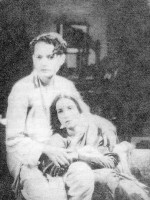
P.C. Barua
(Arup in the bengali version)

Pahari Sanyal

Noor Mohammed Charlie
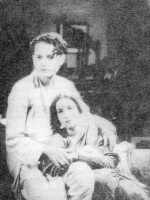
Jamuna Barua
(Minor role in the Hindi version)
Comments
Leave comment :
Suggestions of similar film to Roop Lekha
There are 69 films with the same actors, 9 films with the same director, 70461 with the same cinematographic genres (including 187 with exactly the same 3 genres than Roop Lekha), to have finally 70 suggestions of similar films.If you liked Roop Lekha, you will probably like those similar films :
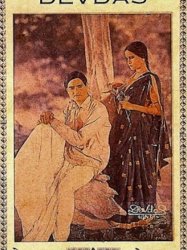
Devdas (1935)
, 2h19Directed by P.C. Barua
Genres Drama
Themes Films about alcoholism, Medical-themed films, Films about music and musicians, Films about drugs, Films about sexuality, Erotic films, Films about prostitution, Musical films
Actors P.C. Barua, Jamuna Barua, Chandrabati Devi, Kundan Lal Saigal, Jamuna, Krishna Chandra Dey
Rating65%





The son of Zamindar Narayan Mukherjee, Devdas was born with a silver spoon in his mouth. He grew up in the lush village of Taj Sonapur, where he spent his childhood, indulged by his lovely playmate Paro. They grew up sharing a special relationship, in which they existed only to each other. Oblivious of all the differences of status and background, a bond that would never break grew between them. Slowly, it changed to love but it was still unsaid. But the reverie was broken when his family sent Devdas to Calcutta for education. Paro's world crashed knowing that her Devdas would be gone and she lit a diya, for it signified the fast coming back of her loved one. Years passed and Devdas returned. Devdas was besotted by her stunning beauty and longed to have her back. But Zamindar Narayan Mukherjee, Devdas' father, met Paro's mother Sumitra's marriage proposal with condescending arrogance. It caused a rift between the families and even though Devdas tried to convince his father, only antagonism came his way. Finally, he moved away from Paro and wrote a letter to her, asking her to forget him. Only, he didn't realize that he would never be able to forget her ever. And much later, when he reached out to her, it was too late as she was far too humiliated. She scorned him for not standing by her and they parted forever with a heart-broken Paro entering into a chaste marriage with a wealthy, much older man, Zamindar Bhuvan, while a shattered Devdas walked towards anguish, alcoholism & Chandramukhi. Chandramukhi, a stunning courtesan instantly lost her heart to Devdas. A unique bond was formed between both as he could share with her the intense pain of his unfulfilled love for Paro. Meanwhile, Paro, on the other hand, performed her worldly duties sincerely, but inside her heart, she could never forget Devdas for a moment. Strange was the fate of Devdas. Intensely loved by two women, who were never meant to be his.
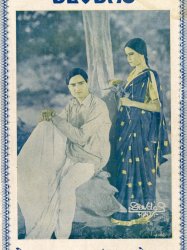
Devdas (1936)
, 2h19Directed by P.C. Barua
Genres Drama, Romance
Themes Films about alcoholism, Medical-themed films, Films about music and musicians, Films about drugs, Films about sexuality, Erotic films, Films about prostitution, Musical films, Bollywood
Actors Kundan Lal Saigal, Jamuna Barua, P.C. Barua, Thanjavur Ranganayaki Rajakumari, Rajkumari, Phani Sarma
Rating59%





Devdas (K. L. Saigal) falls in love with Parvati (Jamuna) with whom he has played since childhood and who is the daughter of a poor neighboring family. Devdas goes away to Calcutta for University studies. Meanwhile, Parvati's father arranges her marriage to a much older man. Though she loves Devdas, she obeys her father to suffer in silence like a dutiful Hindi wife. Devdas as a result takes to drink. Chandramukhi (Rajkumari), a dancing girl or 'prostitute' he has befriended in Calcutta, falls for him and gives up her profession to try to save him. Parvati, hearing of his decline, comes to see him to steer him away from a life of drinking. Devdas sends her back saying in his hour of final need he will come to her. She returns to her life of duty. Realising his end is near, Devdas decides to keep his promise and meet Parvati. He journeys all night, reaches her house and is found dead outside the high walls of her house. Inside Parvati hears that Devdas is dead.
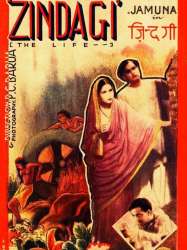
Zindagi (1940)
, 2hDirected by P.C. Barua
Genres Drama
Actors Riya Sen, Kundan Lal Saigal, Jamuna Barua, Pahari Sanyal, Jamuna, Manorama
Rating25%





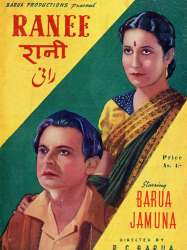
Rani (1943)
Directed by P.C. Barua
Genres Drama
Actors P.C. Barua, Jamuna, Jamuna Barua, Patience Cooper
On the eve of her marriage, Malti, a village girl, finds herself a target of hateful gossip spread by some of the villagers, questioning her chastity. To evade the disrepute caused to her and her family, Malti runs away to the city. The villagers and her family assume her to be dead. In the city Malti finds job as a maid in a hotel where she meets Raj, the Zamindar's (Landowner) younger brother. He has come to the city to learn music. Soon he gets into the habit of drinking. Rani, who has been looking after him, has fallen in love with him. She tries to discourage him from drinking. Raj returns back home to his village, and at the same time Rani leaves her job at the hotel and trains to be a nurse. When Raj's drinking becomes a problem, Rani is called to nurse him back to health. The Zamindar now realises he had wrongly believed the village gossip, and he is happy to have Raj and Rani marry.

Jawab (1942)
Directed by P.C. Barua
Genres Drama, Comedy
Actors P.C. Barua, Ahindra Choudhury, Kanan Devi, Jamuna, Tulsi Chakraborty

Manzil (1935)
, 2h24Directed by P.C. Barua
Actors Jamuna Barua, Pahari Sanyal, Prithviraj Kapoor
Mahim and Suresh are childhood friends, both in love with Achala. Suresh is rich but adheres to conventional values while Mahim is from a poor family but well-educated. Achala has been given a liberal Brahmo Samaj upbringing. Though fond of both friends, she chooses to marry Mahim and they shift to a village. Achala gradually becomes dissatisfied. Their house burns down and Mahim falls ill. Suresh arrives to nurse Mahim back to health and goes with them to a health resort for Mahim to recover. Achala is attracted to Suresh and they both elope. She later returns to Mahim who forgives her.

Devdas (1937)
Directed by P.C. Barua
Themes Films about alcoholism, Medical-themed films, Films about drugs, Films about sexuality, Erotic films, Films about prostitution
Actors Phani Sarma, Zubeida
The childhood friendship of Devdas (Phani Sarma) (who is from a wealthy family) and Paro (Zubeida) (whose family is not as well off) blossoms into love as they grow up. Devdas' father does not approve of the relationship due to differences in their families' status in the village and of their castes. (Devdas is of the Brahmin caste and Paro of the Merchant caste.)

Chandidas (1934)
, 2h8Directed by Nitin Bose
Actors Kundan Lal Saigal, Pahari Sanyal
Chandidas (K. L. Saigal), a lover of truth and humanity is the disciple of Acharya (M. Ansari), a priest in the temple. Baiju (Pahari Sanyal), a washer-man lives with his wife and sister Rami (Uma Sashi) in the village where the Zamindar (landowner) Gopinath (Nawab) though outwardly religious and respecting the Brahmins is an evil man. Gopinath has a henchman Sarju (H. Siddiqui) who carries out his dirty work. Rami sweeps the compound of the temple where Chandidas sees her while he carries on his duties in the temple. They fall in love which causes resentment in Gopichand who has been eyeing Rami, but when she spurns his advances he has her kidnapped. His wife comes to the rescue of Rami and helps her escape. The Zamindar goons go after her and assault her. Gopichand convinces the priest that Chandidas should be punished and made to repent for associating with a lower caste woman. Chandidas agrees to this but then sees Rami’s injuries and realises the duplicity of the so-called pious men. He renounces his life in the village and leaves it accompanied by Baiju, his wife and Rami.
 Connection
Connection